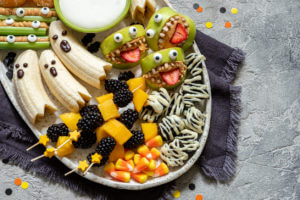Healthy Halloween: How to Avoid Sugar Overload
Is a total sugar overload the spookiest part of your Halloween festivities? Halloween may look a little different this year due to COVID-19, and there are some special considerations for immune health amidst a potential sugar overload. Navigating the candy rush can feel impossible during a time when the main festive event is focused around foods you’d like your kids to avoid much of the year.
Why should you be more mindful of sugar intake this year, and how can you turn the candy craze around to actually work in your favor? Read on to find out how functional medicine can help you and your little ones have the best (and healthiest) Halloween ever.
The Halloween Sugar Rush
The average 4- to 8-year-old today consumes about 50 pounds of sugar each year. This sugar spike takes a toll on kids’ microbiome health, neurotransmitter function, and immune system, and places them at higher risk for serious problems later like obesity, diabetes, and fatty liver. In fact, a 1973 study showed 100 grams of sugar (which is about what’s in a 2 liter soda) inactivates immune cells for up to an hour–yikes! (1)
Along with a lot of sugar, what makes today’s Halloween candy a problem is also the fact that much of it is made with man-made chemicals which hijack your child’s chemistry.
Artificial sweeteners, food dyes, and downright frankenstein-esque preservatives would make even the scariest monsters quake in their boots. Most Halloween candy is made with high fructose corn syrup, and other chemicals that disrupt the body’s chemical messengers and trick us into eating and craving more.
We know excess sugar and processed candy isn’t what we want our kids to eat, but as parents, you also know that prohibiting your kids from having something is the quickest way for them to want it MORE. And you won’t always be around to monitor the healthiest choices when it comes time to eat.
So how do you teach your kids not to go crazy with candy, while also still enjoying the holiday festivities?
Limiting Sugar Doesn’t Have to Be Scary
Kids are incredibly perceptive. Like it or not, the way adults talk about food will have at least some impact upon their attitude towards food.
Labeling food as “good” or “bad” often isn’t the most effective way to teach your child mindful eating practices. This method attaches value to the food itself, rather than to how eating the food makes your child feel. And this can lead to binging on “restricted” foods and create a constant struggle with parents vs. sugar.
Does your child need the help of a holistic nutritionist? Click to learn more.
How to Handle Halloween Candy with Integrative Medicine
When your child has too many treats at a party (or on Halloween) and later complains of a tummy ache, it’s helpful to establish how they feel in connection to that food. “Yes, you had some treats today, and sometimes when you have too many it doesn’t make you feel very good.”
This reinforces mindful eating practices by teaching your child to pay attention to the way food makes him or her feel, rather than whether or not the food is something he should or shouldn’t be eating. For example, a single serving of yogurt can contain as much as 20 grams of sugar, but because adults don’t restrict or talk about yogurt the same way they do candy, kids don’t obsess over yogurt when they have access to it.
Mindful eating helps your children make decisions about quality food that makes them feel good even when you’re not around, which is the ultimate goal in teaching your kids to have a healthy relationship with food, while also cutting back on sugar.
To learn more about how mindful or intuitive eating can help your family, speak with a CentreSpringMD provider today.
Does Sugar and Halloween Candy Cause Behavior Problems?
Mindful and intuitive eating is important to teach your kids a life-long healthy relationship with food, as a high sugar intake early on can negatively impact microbiome health, and neurological and immune function.
Sugar is a common denominator for many neurological disorders, including ADHD and sensory processing disorders. Sugar can also complicate emotional regulation because it creates an unstable source of energy for the brain (2).
Sugar negatively impacts immune function by competing for space within cells with vitamin C. So, too much sugar means vitamin C gets crowded out, unable to do its job within the immune system (3). Immune cells require vitamin C to function, and without it, we’re more susceptible to infection.
Candida overgrowth is a serious gut disorder which often goes undiagnosed, but which is fueled by sugar consumption. Candida is a type of bacteria normally present in small amounts in the gut, but when they increase in number, Candida can overtake other gut bacteria, resulting in behavior changes, digestive troubles, and systemic inflammation.
Healthier Halloween Treats
Still want to opt for less sugar and a little better nutrition this year? There are plenty of kid-pleasing options to go for that parents will love too. These options have less sugar, and a little more fiber and protein, which can help bolster nutrition content and buffer a spike in blood sugar!
For homemade treats, try:
- Pitted dates, stuffed with chocolate chips and drizzled with sunflower butter.
- Coconut truffles sweetened with maple syrup, and coated or drizzled in stevia sweetened chocolate.
For parents, dark chocolate (at least 80% cacao) is a great option for low sugar treats–with only 6 grams of sugar per half a bar, plus fiber which helps offset a blood sugar spike.
For store-bought, individually-wrapped options, check out SmartSweets, Wholesome, Little Secrets, or YumEarth for candy with no artificial colors, flavors, or preservatives.
Continue to Offer Balanced Meals and Snacks
Worried your or your kids have had a little too much sugar? Symptoms of a sugar binge include irritability, fatigue, brain fog, mood swings, cravings, and headaches. Here’s what to do.
First, there’s nothing that will undo eating too much sugar, but there are a few things you can do to balance blood sugar and support the health of your gut.
- Drink plenty of water. The body stores extra water during an increase in sugar. Plus, drinking plenty of water can help support natural detox pathways as well.
- Don’t skip meals. It can be tempting to restrict or reduce foods after overindulging in too much sugar, but balanced meals with protein and fat will help support a healthy blood sugar balance after a sharp spike in sugar.
- Add movement. For most kids, a little extra activity isn’t an issue, but some adults may feel lethargic and sleepy after a sugar binge. Light exercise can help your body use stored glucose (sugar) faster, and release natural anti-inflammatory messengers in the body.
Integrative Medicine – Pediatrics
Because Halloween occurs right at the beginning of cold and flu season, an influx of sugar can result in compromised immune function, and set the stage for continued bad habits throughout the holiday season.
Integrative medicine can help you best support your child’s nutrition, immune system, and weather the cold and flu season with peace of mind. Depending on your child’s needs, click below to learn about the best prevention and functional medicine solutions.
- After 5 Wellness Membership
- Under 5 Wellness Membership
Click to learn more about how integrative medicine can help your child reach his or her full potential.
Resources

